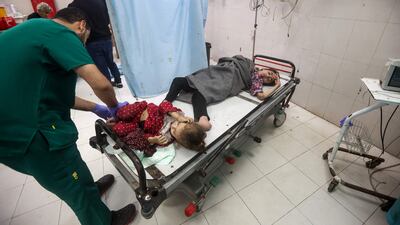Live updates: Follow the latest news on Israel-Gaza
The number of unnecessary amputations in the ravaged Gaza Strip is "huge" not least due to the lack of specialists such as vascular surgeons, the World Health Organisation warned on Thursday.
The organisation's Emergency Medical Teams co-ordinator Sean Casey said he has been seeing amputees "everywhere", as he spoke to reporters from Rafah in southern Gaza.
"There are huge numbers and we don’t have a clear tally. Many of them are, unfortunately, last-resort amputations to save a life" due to infections, he said.
Communications blackouts and the overwhelming influx of the injured are making it difficult to assess the situation accurately in Gaza.
Since October 7, more than 20,000 Palestinians have been killed, mostly women and children, and more than 50,000 injured, according to the Ministry of Health in Gaza.
Doctors say they are doing their best to save lives, even if it means cutting off limbs, without clean water and a proper system for post-operative care in a healthcare system that has been annihilated.
Even when food and water are available, Mr Casey said many people are bedridden and are physically unable to move to get access.

Hunger
While delivering medical supplies to hospitals such as Al Shifa in Gaza's south, and elsewhere, Mr Casey says the prevalence of hunger has been striking, as people in the most physically gruelling situations still ask for food over medicine.
"I walk around in emergency rooms and people with open, bleeding wounds ask for food. If that’s not an indication of the desperation, I don’t know what is."
NGOs have been increasingly reporting instances where people have been jumping on lorries they believe contain food and clean water, in a bid to obtain some for themselves and their families.
Gaza's children are getting only 10 per cent of the water they need, at only 1.5 to 2 litres a day, with "barely a drop to drink" left, the UN said on Wednesday.
"We move around Gaza for medical supplies and people rush to our trucks hoping it’s food," Mr Casey said. "When we say it’s medical supplies, they move out of the way and clear the rubble for us."
Mr Casey, who has had experience in South Sudan, Iraq and Liberia, said he has never witnessed the type of "avoidable suffering" that he is seeing in Gaza.
He said one woman wanted to make a plea to him for help, but couldn't speak because she was so dehydrated.
Speaking from Jerusalem, WHO representative in Gaza, Richard Peeperkorn, said the lack of food was affecting healthcare workers themselves, as some are having to "scavenge" for sustenance.
Even the WHO's own teams are struggling, with only 30 per cent of their members working.
The rest, Mr Peeperkorn said, are in "survival mode". Despite the figures being reported every day by various NGOs and UN organisations on the ground, he said the situation is worse than it seems.
"Sometimes I feel that voices are not heard enough. The misery is much larger than people think."
Still, there is work being done to alleviate the suffering.
Last week, the WHO participated in a joint UN mission to Al Shifa Hospital in Gaza's north to deliver supplies. They called it a hospital in need of "resuscitation".
While missions such as this are being carried out and attempts to deliver fuel to hospitals and desalination plants to provide clean water are being made, in response to a question on when it would be considered "too late" for Gaza, Mr Casey said: "We're already too late."



